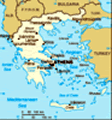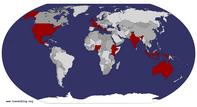Advertisement
Published: September 17th 2006
Night was falling. Surrounded by clothed peoples, new country and the craggy coastline I have come to familiarize with Greece, I hopped a rock-stacked wall and slipped out of sight. With the guidance of twilight casting a mellow shadow passed each stone, I tumbled down a hill and stepped onto a wind-drift patio; desolate, dirty, with piles of dried eucalyptus and bougainvillea tassels spinning round their mounds. This was it. Perfect. Soon, I watched the moon rise to shine its reflection down across the spreading Aegean Sea—the setting to an episode of Indiana Jones on the island of Karpathos.
Island Bound Mythical Zeus and King Minos were left alone. As the nudists of Plakias and the northern strip malls of Northern Crete’s highway 90. I packed my few clothes, rolled up my tent and blanket and caught the segmental bus routes eastward to Sitia. Night fell with salt caking my face, yet a bed and a shower, the first in seven days, carried me into a dreamless sleep.
Morning and onward, the expeditionite of travels to the far spires of islands. Aboard the F/B Kornarpos under the direction of Crete’s own LANE Lines, I found myself hesitant about the
destination. Where would I sleep? What would I do to pull off these minimalist wanderings? Too much sun? Not efficient transportation? Too many clothes on the beaches? Would I become marooned far out in the Aegean with the cessation of summer and the busying ferry routes, or would pirates settle up my few goods, divvying up the booty of their electronic fantasies? Would a cell enclose me behind a rotting Karpathian doorway? Who would I capture, and more reasonable, what? O better yet, who would capture me?
On ship, it’s impossible to switch destinations. I thought about it, surpassing Karpathos for a further 5 ½ hour sail at twenty knots to Rhodes (Rodos). But once you pay the ticket agency on land, you’re settled. The captain, nor the crew or passenger pursuer, would accept money on behalf of LANE Lines. Even a bribe? I could pretend I was asleep at port?
“Nope. You must get off!” Eyes pierced me through his thin-rimmed glasses and dark skin, yet after Plakias, I could vouchsafe that my once searing white areas, never-before exposed, were now flush to the Grecian skin I now attained.
So, I stepped off, bound for Karpathos.
Pigadia Yesterday & Today
Like a rabid swarm of fleeing bunnies, passengers departed and those at the opposite end boarded. We each embarked on our unique paths, and with a staunch horn, the ship dislodged from dock. Its props churned the aquamarine waters. I was ashore on Karpathos.
I waddled like a goose. The gusts of wind, the stubborn
meltemi that kept the sides of my tent luffing through the mere hours of night to dawn, sent me topsy-turvy. Already top-heavy with backpack and shoulder bag, I wound my way around the mouth of Pigadia Harbor to gaze upon the shops. Your classic, pretentious tourist traps sat amiably by the water’s edge. Cafes and tavernas with the latest designer’s boutique tea sets and retro clubbing attire from Milan lined the whitewashed buildings in the background. They were sheltered in plastic retractable walls from the afternoon sun and few tourists sipped their frappes and cappuccinos. I glanced, soaking in the scene while softly attracting the attention by the oddity of my rope sandals. Eventually, with the stage of coffee-lounging boardwalks, the traditional Grecian
kanefeia overtaken, the road curtailed round a corner to the sprawling sandy beaches northward. I cut in the
buildings’ narrows out of view toward the depths of town.
The street was shaded, but the walls reflected a natural light. They stretched heavenward—two-stories, often four or five on a hotel’s foundation—and little balconies created angular grey shadows. These wrought iron or wooden platforms were painted in the pastels of yellow, seafoam and indigo beside their equally exceptional window framings. Doors were either freshly coated or left with character. Cracking to the innumerable years of summer heat and winter rains, doorways were a layer of wood peeling away like bark from an aged dying tree. And chipped to the raw surface were the various applications of primer and paint. Ionized and crystallized, large bulwarks of medieval doorknobs corroded with an ancient Grecian culture. A chipped sand blown piece of glass prohibited the eyes from glancing through such magic portals into the wisdom of passed generations. My head turned, eyes locked on the raiment brought on by the passing seasons, as I followed the streets toward an unknown, but real, bus station.
Roused From Dormancy One thing fantastic with travel is that distinct sense of unknown. Where? When? And What? With a how and with whom? I love
it, yet it is something to become accustomed with after being wrapped in the swirl of daily sleep, work, eat, and sleep. And in small, obsolete towns like Pigadia, Karpathos main transportation hubbub, things are constantly on change. Buses run when they wish in parallel with the narrow crisscrosses of pandemonium in which the streets follow.
And unknown to where I must go, I wander, I ask. Fingers point, instinct drives, shaking off the cobwebs and collected dust from prior days when everything was mapped out. But the road and the explorations of what lies beyond rouses the essential psyches of the human spirit to bring a secure trust for survival and wellbeing. I remember trekking in Nepal, alone with the ghostly shadows of Maoist rebels lurking in the rhododendron trees, when a snowstorm hit. Captured in the ethereal grips of a cloud and swirling snow, I walked hither and thither, lost, but not fearful. Behind me, around me, within me was that permeable sense of intuition that once exercised and trusted, nothing else is needed to show the way. You already know.
I shook. I danced. I brushed off those dusty webs and stepped aboard a belated
bus with the setting of the sun.
Fifteen minutes I was in Ammoopi, a center-less destination that sprawled upon a hillside where sparse hotels and studios dot the terrain. And here it kicked in.
Number one: I was homeless. I did not have a reservation. I didn’t need one.
Number two: I had everything I ever needed with me. Now, I just required a space to inhabit for the days to come.
And Number three: My intuition was ready.
From the bus, the scent of sea breeze struck my face. I walked along the worn shores of passed sieges of empires, but a land that was kept under a foggy cloud of mighty god-king Jove from the evangelical Knights of St. John. I knew my time was limited, and the coast extended to small coves and offshore islets. I had much ground to cover, specific to the size of tent, the flux of tides and the possibilities of availability when it comes to property.
At the bus stop a small monastery looked out over a cliff. Thorny bushes and thin sandy pathways created a labyrinth, but beneath the overhang, the sea slid up a pebbly
shore. Bent over a railing, the surface of stones and rocks made the imagination coil in pain as it thought of the nights tossing and turning. A sharp rock in the shoulder. Turning over, another one in the gut. Wind, cold, the tides—things seemed as if all could befall the darkness of sleep.
I lurched on. A path wound the cliff and exited at various earthen coves where more pebbles and stones overtook the beaches. So I climbed onward to a high summit where a calm, lonely façade grew dimmer with the sink of the sun. Perfect.
My eyes darted round like an alert kestrel on a wind-driven land. A few hotels littered the area, their owners cleaning and prepping in time for dinner. Shadows were deepening, and I waited atop this hill until darkness would envelope my expedited descent, for beneath me there lied an abandoned home. Red shingles adorned its roof, thick wooden planks resting on large rusted hinges boarded up the windows and an empty pool shot a sharp azure coating into the sky. The time was right, and I tumbled down to my new home.
The setting was pristine. To be sure, the
home was a summerhouse, or vacation home. The pool was lined by palms on a patio that was bordered by a railing that sat on the edges of the eastern Aegean Sea. Trellises were dry, once entangled with the imagination’s grape vines, and an empty green house sat derelict off to the corner of the property. Fig, lime, pomegranate and eucalyptus trees were dotted around the grounds. With the nude beaches of Plakias far off, sleep caught hold of me as I set down my bags, unfolded my blanket and stared up at the falling stars and passing satellites on a red-tiled patio. Under the dome of the night sky, darkness completely veiled my eyes.
The Weight of Karpathos This empty abandoned house was my base for three nights as I explored Ammoopi, the town of Pigadia and Apella Beach, located to the north along Karpathos’ eastern littoral. And being surrounded by pricey hotels, I operated my entrances and exits into this abandoned shelter with stealth strategy. Either by night I slithered under the shades onto the patio where my bags remained stored behind large pottery, or from above the flanks of the cliff, where a caveman-stylized rampart
of rough porous stone stood high at various edges. From either cover, I blended into the landscape to make certain my stay would last as needed, and my bags would remain unfound.
And now, to this moment, the exploration of Karpathos comes to a close, where its beaches prohibit nudism and the sands around Ammoopi remain uncongenial to the backpacker. Likewise, the land is dry, with empty spatial hillsides folding down into the sea. Goats and sheep roam, clinking their neck-loop bells as the sun burns and the
meltemi howls. Karpathians are more kindly to the stranger, but you can tell they’re already tired of the budding tourist trade. Their island invokes retired Italians, Germans and Scandinavian tourists with the few parading families and independent travelers. And to listen to the constant verbal probing these laid-back islanders must succumb to, it is no wonder the tiresome faces the bus drivers wear as they drive back and forth, back and forth to exuberant foreigners.
I sit writing, plugged into the wall of the small monastery in the town. People come and go; local men spinning their
komboloi (Orthodox rosary beads) round their hand and tourists bedecked in helmets from off
their rented mopeds. They see me sitting in the corner. Alone, tan, dressed simply with strange rope sandals that welcome strange whispered finger-pointing and foreign comments, and then a computer. Cross-legged, I feel the soreness of my back after the hard surfaces of three nights’ rest, but stiffness was alleviated through the morning practice of yoga. In the variety of asanas, I overlooked the sea out into a weightless realm. Whether it was the bathwaters of the beaches, the shooting stars in the night sky, or the numbing of my spine as I adjusted to the tiled bedding, it was all fleeting from one traveler to the next. Karpathos to Rhodes into Europe’s largest inhabited medieval town.
Advertisement
Tot: 0.076s; Tpl: 0.011s; cc: 15; qc: 31; dbt: 0.0238s; 1; m:domysql w:travelblog (10.17.0.13); sld: 1;
; mem: 1.1mb


















anonymous
non-member comment
thanks for taking us along....the view from your "vacation home" seemed amazing - what a peaceful place. XO, Mom